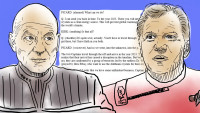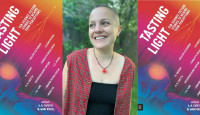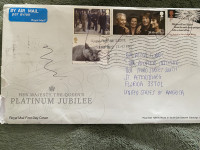
ChatGPT showed me just how far it is from writing a blockbuster
techradar.com – Sunday February 26, 2023

10,000 hours. That’s how long, at least according to author Malcolm Gladwell, it’s supposed to take to master a craft. Or, if you’re an AI a matter of months, weeks, or days.
When I read that ChatGPT is now such an adept writer it’s already authored hundreds of books on Amazon’s self-publishing service, I experienced a mini freakout. To be clear, OpenAI’s groundbreaking chatbot is not publishing these tomes on its own. People are working with ChatGPT to develop themes, stories, and chapters for their books.
My immediate reaction was, “I’m doomed.” But as the icy chill of that cold reality receded, I considered something else. Anyone can write and publish a book, and most of them won’t be very good.

Thrillers, Yes—Join the Genre
By G. Miki Hayden
Instructor at Writer's Digest University online and private writing coach
firstwriter.com – Sunday February 26, 2023

5 Ideas for Finally Making BIG Money
Don’t say I told you this, but Murder Your Employer: The McMasters Guide to Homicide is listed by Amazon as one of its big sellers already this year. It’s also a thriller. The book is from Simon and Schuster.

3 Common Writing Mistakes New Sci-Fi/Fantasy Authors Make
theportalist.com – Friday February 17, 2023

Ioften get two responses when I tell people that I write books. The first is, "Oh, I don't think I could ever do that!" The second is just the opposite. "You know, I had an idea for a book myself."
The truth lies somewhere in between those two thoughts. It's certainly not impossible to write a book, but it takes more than a single good idea. You can write a great scene in a day, but a novel is often a labor of deliberate love. It takes time, planning, and revisions.
As a writer and an editor, I have seen many first-time authors (myself especially) struggle with the same few problems. This article highlights one issue I often see at the beginning, middle, and end of new authors' works—and how you can fix them.
If you are writing your first book, these tips can improve your manuscript and help you actually finish.

Want to be a writer? This bleak but buoyant guide says to get used to rejection
npr.org – Wednesday February 15, 2023

"No whining."
That's one of Stephen Marche's refrains throughout his provocative essay called On Writing and Failure. As a writer himself, Marche would never deny that writing is hard work: He well knows that writing for a living is fatiguing to the brain and tough on the ego and that the financial payoff is overwhelmingly dismal. But, by repeatedly saying, "No whining," Marche is telling aspiring writers, in particular, to "get used to it."
His aim in this little book is to talk about "what it takes to live as a writer, in air clear from the fumes of pompous incense." And what it takes, in Marche's view, is to have no illusions about the certainty of failure. Even beyond talent or luck, Marche argues, the one thing a writer needs to get used to is failing, again and again.

Tips and Resources for Writing Your First Sci-Fi/Fantasy Novel
theportalist.com – Sunday February 12, 2023

These books helped me learn about story structure, characterization, and the most important aspect of writing: persistence.
Like many writers, my very first attempt to write a novel began with one scene. I saw dust motes floating through sunbeams, framing a woman sitting at a bar made of antique wood. Over the years, I’d wonder about that woman. Who was she? Why was she sitting at a bar all alone with nothing but trickles of sunlight to keep her company?
These are the kinds of questions and images that set authors on the journey of writing. But the more I tried to figure out who she was, what the story was, the more elusive it all became. This woman became the symbol of my creativity. Sitting in isolation, stuck in a liminal backdrop that refused to budge. The encouraging voices telling me I could write and should pursue it were drowned by a much louder, far more formidable force: doubt.

A.R. Capetta’s Top Ten Tips For Writing Speculative Short Stories
i0.wp.com – Sunday February 12, 2023

To celebrate the release of their sensational new YA sci-fi anthology, Tasting Light: Ten Science Fiction Stories to Rewire Your Perception, co-editor A.R. Capetta, shares their top ten tips for writing speculative short stories.
1. Write that first draft as quickly as you can get it down—without giving yourself time to judge it. If your story involves worldbuilding or even research, like many of the science and tech-inspired stories in Tasting Light, you can do that beforehand and layer in more afterward. But as you write a first draft try not to interrupt your brainwaves while they’re chasing the single, brilliant beam of light that is your idea.
2. Speaking of light! A great speculative short story is like a beam of light that’s gone through the facet of a prism. It is focused and transforming. As part of your writing process, read some of your favorite SFF stories. Look for the focus. Look for transformation—both in the story itself and in how it changes things for the reader.

Why publishers are such cowards
spectator.co.uk – Sunday February 12, 2023

After publishing 17 books, I’m no stranger to the publicity campaign. In my no-name days, my publicist would purr that my novel’s release would be ‘review-driven’ – which decodes: ‘We don’t plan to spend a sou on your doomed, inconsequential book.’ By contrast, as we’ve seen writ large with Prince Harry’s Spare, your volume can be cast upon the public waters as not a mere object but an event. The intention is to convince book-buyers that unless they snap up a copy sharpish they’ll be caught up short at cocktail parties.
Thus quite some time ago, some editorial Baldrick at William Collins must have whispered to Nigel Biggar, a newly signed author at the HarperCollins imprint: ‘I have a cunning plan.’ Clearly the concept driving this week’s release of the Oxford professor’s Colonialism: A Moral Reckoning, which before our current Year Zero would never have caused a stir, was to convert misfortune to opportunity, much as manure can convert to fuel.
As I’ve read the story in some ten different articles, interviews and reviews, including in last week’s Spectator, we’ll keep the recap short: Bloomsbury commissions book on British Empire; Bloomsbury loves book on British Empire; Bloomsbury gets the willies about too-hot-to-handle manuscript claiming British Empire did some good things as well as bad and pays off author to go away. Behold, yet another ‘cancellation’ in an industry that once audaciously scandalised genteel sensibilities with the likes of Ulysses or Lady Chatterley’s Lover and is now renowned instead for cravenness, fearfulness and slavish conformity.

One brash request, 7 books, and 34 bits of advice for writers
poynter.org – Thursday February 9, 2023

How a whimsical invitation featuring the Rolling Stones and a Shelley poem led to some essential writing advice.
Early in October I received a small package from England, which looked most interesting even before I opened it. The envelope celebrated “Her Majesty the Queen’s PLATINUM JUBILEE.” Five stamps carried the postage, each with a distinctive image: Soldiers from World War II; three lines from my favorite Percy Bysshe Shelley poem, “To a Skylark”; four members of the Rolling Stones; and a gray cat with its eyes closed.
When I flipped it over, it was sealed with a Mick Jagger stamp and a handwritten note: “He also can’t get no satisfaction …”
I was intrigued. Whoever sent this seemed to know something about my interests and sensibilities. The sender was a writer named Paul Khanna. He described himself as a scribe who was, like Jagger, not getting satisfaction from his work; no mention of his acting career. He had written three diet books and had taken a course on screenwriting during the pandemic. He experienced personal setbacks. Both parents suffered serious illnesses and his cat went blind. (I thought of that stamp of a gray cat with its eyes closed.)
What did he want from me? It turns out he had read two of my books and found them helpful. He then caught a notice of my new book, “Tell It Like It Is: A Guide to Clear and Honest Writing,” due out April 11. He wanted a preview copy. “Just like the Apollo 13 which launched on that day,” he wrote, “I’m feeling lost in space and can’t wait to find my way home.”

Mysteries Contained Therein: In Praise of the Literary Journal Longform Interview
lithub.com – Sunday February 5, 2023

“I’ve never consciously strategized about how to make a sentence, let alone a poem. But I can see, even in the earliest poems, that my way of making a sentence involves enacting the push and pull of my interior life, a way of approaching a statement while also making room for its opposite.” In the year since the poet Carl Phillips wrote those lines in our conversation for Image, I’ve lingered over their sound and sense. Their wisdom. How we might discover ourselves through syntax.
No literary action is more instructive for me than the longform interview. At Image, we feature one interview per issue: an anchor for the surrounding words and art. I’ve long admired Phillips as a poet, but after our conversation I more fully appreciated his method. Interviews partially reveal the mysteries of process and vision. Literary magazines—spaces where craft and contemplation reside—are the perfect homes for these conversations.

7 Newsletters That Will Improve Your Writing
electricliterature.com – Saturday February 4, 2023

The resurgence of the email newsletter over the past couple of years is great news for writers. So much of our work requires probing our deepest thoughts in isolation, biting our cuticles, staring at cracked paint on the walls. Whether online or IRL, sharing insights and developing community is essential for survival. Subscribing to newsletters by writers, for writers is a way of staying in conversation with peers. Email newsletters can offer emotional support, tips and exercises for improving craft, and resources for getting published that might otherwise be inaccessible, especially to writers beginning their careers. Some even promote community-building by establishing writing challenges and providing platforms for writers to discuss their experiences. The seven newsletters below offer the best of craft and publishing advice, writing prompts, pitch calls, and encouragement and commiseration about the writing life.
Get the free newsletter | Submit a news item or article | Get Writers' News for your website





